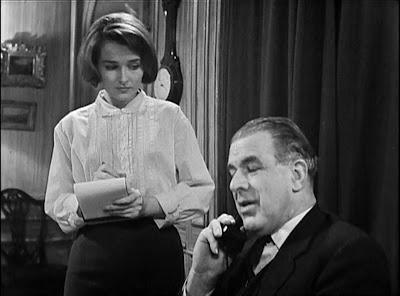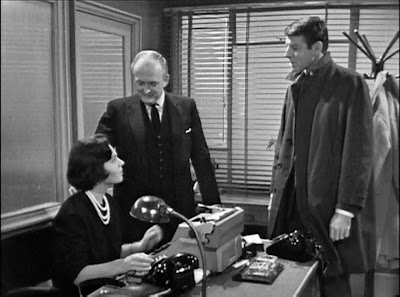We open this week with the dramatic scene of a mysterious figure breaking into a safe in a laboratory, only to be interrupted by a stock footage chimpanzee.
PG7's not a new BBFC rating, it's an airborne inhalant gas set to revolutionise warfare, and the file on it has gone missing. Nick Craig's back after a few weeks' absence to handle the case. Superintendent Stock's mysteriously absent once more, though, his place as head of Ghost Squad taken this week by the rather dreary Superintendent Owen (Ross Hutchinson). Jean Carter definitely doesn't think much of him, if the unimpressed looks she casts his way are anything to go by.
Nick heads down to the labs of Paxter and Winch, pretending to represent their Canadian office. He meets director Professor Haydon (Frank Gatliff), who seems very close to super-efficient administrator Diane (Pauline Yates).
But Haydon's just one of two men Diane's got on the go. She's also seeing Professor Boone (Michael Gwynn), the developer of PG7, who left Paxter and Winch after fighting with Haydon over Diane.
Boone's a naive idealist who's been hoodwinked into making PG7 for American arms dealer Mr Sullivan (Gordon Tanner). He's of the belief that the gas just sends people to sleep, making it "the ultimate humane deterrent": if any country starts making trouble you can just knock its entire population out. That'll learn 'em. But Craig witnesses tests on chimps that prove that shortly after coming round, the unfortunate gassee always drops dead.
It turns out Haydon knew all about this but deliberately omitted to let Boone know. "Oh yes, a childish manoeuvre in your dreary little sex war," spits Craig (the most preposterous of several odd lines in Joshua Adam's script). Despite the dialogue Michael Quinn's unusually impressive as Craig in this episode, convincingly contemptuous of the scientists' petty squabbles.
Sullivan has a prospective buyer for the gas in the ruthless Faria (rent-a-foreign-baddie George Pastell). Jean gets an unusually exciting task in trailing him to his lair above the Gay Hussar restaurant - only to be tied up and tortured in a most peculiar way by his regulation burly henchman.
Craig sets out to rescue Jean from Faria's evil clutches with the help of his network of informers - my favourite of whom is "Gert the Gypsy, who'd sell her own daughter for a bottle of gin". I've seen the actress who plays Gert in tons of uncredited bit parts and I've no idea what her name is. If anyone can help I'd be very grateful.
Meanwhile (it's an usually action-packed episode, this), Sullivan gets Boone to try out the PG7 on his increasingly useless spy Todd (Alister Williamson),the lab security chief, as an alternative to the oblivious scientist's original suggestion they try it on themselves.
In an unexpected twist, Faria turns out to be horrified when Craig informs him of PG7's deadly nature, and agrees to skip the country and have no more to do with the gas. Our hero manages to reach Sullivan's headquarters and arrest him just in time for Todd to drop dead with a satisfying "Ah-haaaaaargh!"
Make sure you tune in next week for the last ever Ghost Squad!
A girl named Jane (Meg Ritchie) lies confined to bed, subject to the ministrations of her sinister guardian (Mary Kenton)...
 |
A comparison of this week's episode title to last week's suggests that either there have been over 1500 cases since last week's or that the Victorian CID had an extremely confusing filing system. Anyway, Sergeant Cork's returned from solving a case up north to the tender attentions of his cheery housekeeper Mrs Fielding (why, it's Carmen Silvera, from 'Allo! Allo!). But before he can sink his teeth into her pudding he has to deal with a difficult client brought to him by young Bob Marriott.
This quarrelsome lady is Miss Beasley (Margaret Diamond), and the sickly girl we saw earlier is her niece. Since her father's death at sea young Jane's been left in the care of her stepmother Charity, of whom Miss Beasley strongly disapproves, and the mysterious Dr Lukas, of whom she disapproves even more strongly (principally because he's a foreigner). Miss Beasley's convinced her niece is being slowly poisoned by this pair. As the woman's clearly deeply resentful at having her place in the household usurped by Charity, Cork's more than a bit sceptical of her accusation. But he decides to follow it up, not least as he finds the starchy spinster a fascinating psychological case study.
We already know there's something dodgy going on in the Beasley household, so there's no real suspense on that count, but there's still the question of exactly what. Cork's actually sidelined for most of the episode, with the focus on the pathetic Jane and her sadistic tormentor. There's a pair of superb performances from Ritchie and especially Kenton, who makes the ironically named Charity a deeply frightening character - there's a sense of a terrible rage bubbling just underneath her genteel surface. "Is that what you'd like to be Jane?" she taunts her stepdaughter, "A lunatic in an asylum?" We never get to see Charity's wrath in full flower, but it's clear that it would a terrible thing to behold.
It's the purest of Victorian melodrama, but with the arrival on the scene of Charity's lover Dr Lukas (TV's Germanic baddie of choice, Joseph Furst), a more contemporary angle emerges. Lukas is a pioneer in the science of the mind, his enormous monocle doubling as a handy hypnotising tool.
Far from plotting to kill Jane, Lukas has something even more sinister in mind. He intends to use her as a guinea pig for his studies, subjecting her to various severe traumas in the belief they will lead to the erasure of her personality, after which he can create a brand new one from scratch. It's an idea familiar from various cold war brainwashing stories, and the basis of the then-recent Dirk Bogarde film The Mind Benders, but seeing it translated to a Victorian setting is wonderfully strange.
Slowly, the monstrous Charity becomes something like a sympathetic character. "You are a very strange person, aren't you?" asks the doctor. "You have enjoyed hurting the child, I've watched you." Charity opens up about her inner feelings: "Sometimes it's burning in my head and then yes, yes, I enjoy hurting her. And then other times I just want to take her in my arms and beg her to forgive me." She begins to realise the extent to which she's been used as Lukas casually admits that while she imagined them to be in love he's been studying her as a case of split personality and keeping detailed notes on her.
With the help of an old friend in the medical profession (Philip Latham in a ludicrous stick-on beard), Cork manages to work out what Lukas is up to - but he's already subjecting the murophobic Jane to her worst experience yet, being locked in a room full of rats...
...and I shall use that as a highly tenuous link to see what the nation's youngsters have been dancing to this week. Gerry and the Pacemakers cling on to the top spot with "I Like It" and the Shadows remain at 2. At number 3 here's a song it seems doubtful all that many youngsters have been dancing to, Frank Ifield's "Confessin' (That I Love You)".




























No comments:
Post a Comment